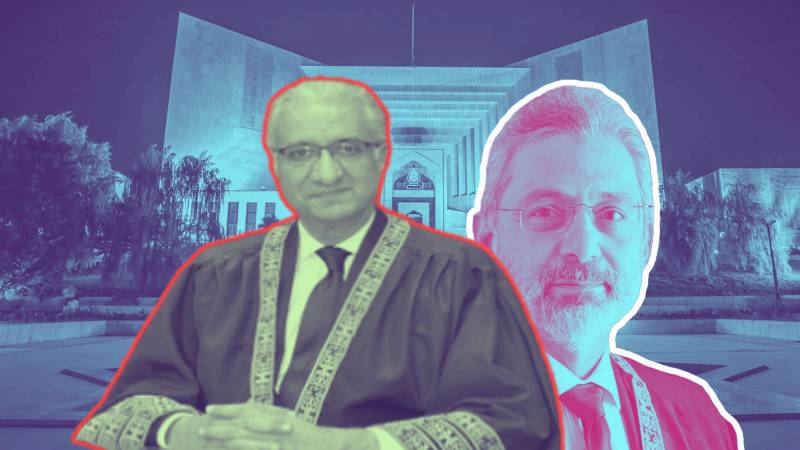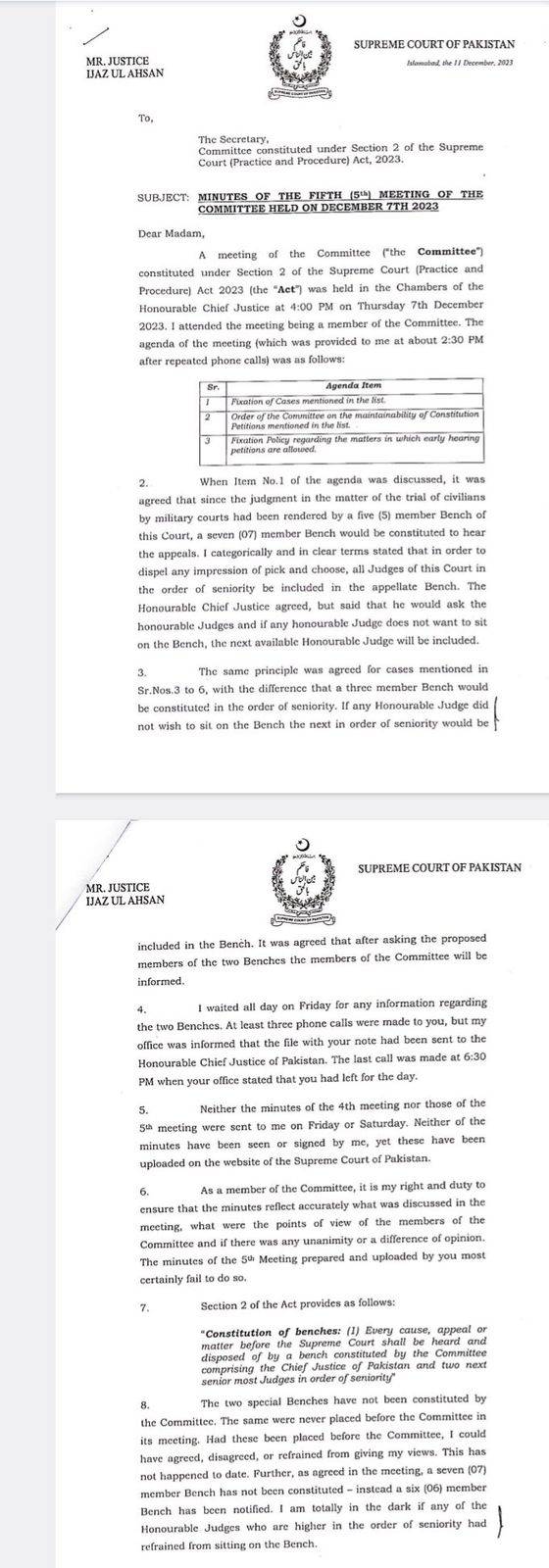
In a surprising statement, Justice Ijazul Ahsan has claimed that the larger bench formed to hear petitions challenging the Supreme Court's verdict against the trial of civilians in military courts did not adhere to the prescribed formula. He also objected to how the bench was formed to hear a petition filed by Justice Mazahar Ali Akbar Naqvi over the reference against him.
In a letter to the Supreme Court Registrar -- who is also the secretary of the judge's committee -- on Monday, Justice Ahsan noted that a meeting of the three-member judge's committee was held in the Chief Justice of Pakistan Qazi Faez Isa's chamber to decide benches for hearing cases.
He noted that the committee meeting was set for 4pm, but he received the agenda for it just 90 minutes prior. He said that it took repeated phone calls to get a copy of the agenda.
The agenda included fixation of cases, order of the committee on the maintainability of constitutional petitions and fixation policy regarding matters in which early hearing of petitions are allowed.
When Item No.1 (fixation of cases) of the agenda was discussed, it was agreed that since the judgment in the matter of the trial of civilians by military courts had been rendered by a five (5) member bench of this court, a seven (07) member bench would be constituted to hear the appeals, Justice Ahsan wrote.
"I categorically and in clear terms stated that to dispel any impression of pick and choose, all judges of this court, in the order of seniority, be included in the appellate bench," he said, adding that Chief Justice Isa agreed to this and added that he would ask the judges and if any judge does not wish to sit on the bench, the next available judge will be included.
Justice Ahsan continued that the same principle was agreed upon for other cases, with the difference being that a three-member bench would be constituted in the order of seniority.
If any judge did not wish to sit on the bench, the next in order of seniority would be included in the bench.
"It was agreed that after asking the proposed members of the two benches, the members of the committee will be informed."
However, Justice Ahsan said that he waited for the entirety of Friday for any word on the final composition of the two benches.
Despite making three phone calls to the registrar's office, Justice Ahsan was told that the file with his note was still pending with Chief Justice Isa.
He added that the minutes of the past two committee meetings were not shared with him for signing but they were still posted on the Supreme Court's website.
"As a member of the committee, it is my right and duty to ensure that the minutes reflect accurately what was discussed in the meeting, what were the points of view of the members of the committee, and if there was any unanimity or a difference of opinion," Justice Ahsan stated, adding that the minutes of the fifth meeting prepared and uploaded by the registrar "most certainly fail to do so."
He said that two special benches were not constituted by the committee since the matter was never placed before the committee.
"Had these been placed before the committee, I could have agreed, disagreed, or refrained from giving my views. This has not happened to date," he said.
On the six-member bench formed to hear petitions challenging the top court's verdict on declaring the trial of civilians in military courts as illegal, Justice Ahsan said that they had agreed to form a seven-member bench on the matter. Instead, a roster of six judges was issued.
"I am totally in the dark if any of the judges who are higher in the order of seniority had refrained from sitting on the bench," he added.

The letter shows a growing fracture within the new regime in the Supreme Court on the critical matter of fixing benches, a key area of concern during the tenure of Chief Justice Isa's predecessor.

